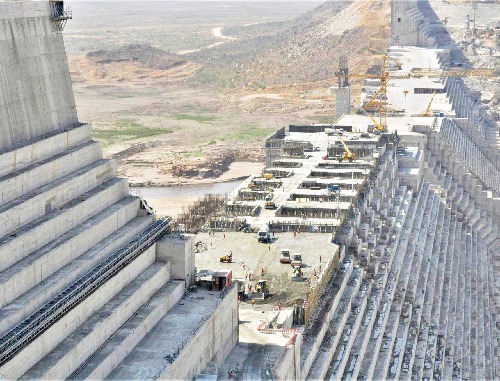
The expert also argues Egypt’s attempt to put undue pressure on Ethiopia through the Arab League, US, World Bank reveals serious contempt to Ethiopia’s sovereignty, fellow African countries and African institutions
As Ethiopia is finalizing preparations to start the filling of the Grand Ethiopian Renaissance Dam (GERD) next July, an international law expert said the country has been following the highest moral standards and international law in relation to GERD.
Speaking to The Ethiopian Herald, Zelalem Moges, (Ph.D) said Ethiopia’s decision to build GERD and utilize its water resources is not only justified in light of international law but also highest moral standards.
Poverty is an existential threat to the country. Hence, fighting poverty is a means of ensuring the survival of Ethiopia and GERD is indispensable in becoming victorious in this fight, he said.
“In this vein, Ethiopia is not building a nuclear bomb to destroy others, but instead is building a water dam to lift its citizens from abject poverty. In doing so, it nevertheless has not disregarded similar interests of Egyptians or ever wished to preserve its own at the expense of Egypt.
“Ethiopia has always considered the fundamental interests of Egypt and attempted to continuously engage Egypt in the course of the construction of the dam. This musters the highest moral standards of any kind” said, Zelalem. The Government is also under an obligation to ensure an adequate standard of living to its people.
From the perspective of international law, the construction of the dam is both justified and necessary. Most international and regional human rights treaties and other rules of international law recognize the right of all people to social and economic development Zelalem said
adding Ethiopians, as Egyptians, do have the right to develop using their natural resources, including the Nile.
As to him, when it comes to Tarns-Boundary Rivers, international law enjoins upper riparian countries from causing significant harm to lower riparian countries. However, such an obligation is a two-way street, that is, lower riparian countries are obliged to desist from activities that occasion significant harm on upper riparian States.
“In both cases, it should be emphasized that what international law proscribes is significant harm, not every sort of harm. This is relevant because water is a scarce commodity and its use by one country, naturally depletes the resource and some harm is inevitable,” he explained.
He also said when it comes to GERD, there is no scientific evidence showing that the dam will cause significant harm to Egypt. “All evidence indicates that Egypt will in the long run benefit from it, as evaporation is lower in Ethiopia than in the Aswan Dam and the regular flow of the water can be maintained.”
Egypt’s current problem does not seem to be coming from the fear of facing significant harm as a result of the construction or operation of the dam.
“Instead, as its recent letter to the Security Council clearly shows its principal fear is seeing what it calls a ‘’hydro-hegemonic’’ power in the region. This is not a question of fairness but a desire to sustain unjustified dominance and sheer hypocrisy. If it were an issue of fairness, Ethiopians would have stood by Egypt’s side, for Ethiopians know and sympathetic to the true causes of justice and fairness,” he said.
As to the expert, the way forward is not to stop engaging in zero-sum smear campaigns or escalate it into a security issue. It is an economic one and should be a source of cooperation and mutually destructive conflicts.
“Egyptians should also embrace their Africans and try to ‘Africanize’ their engagements. It is pathetic that Egypt always chooses to run to global institutions and non-African countries to resolve its disputes than involving leaders from fellow African countries and the good offices of African institutions such as the African Union.
“Egypt’s attempt to put undue pressure, under a threat of coercion, on Ethiopia through the Arab League, the United States, and World Bank is not only pathetic but also a serious failure of diplomatic protocol.
“It also revealed a serious contempt to Ethiopia’s sovereignty, fellow African countries and African institutions, and above all, a total disregard of the basic principles of peaceful dispute settlement recognized by the African Union Constitutive Act and the United Nations Charter,” he underlined.
It is, therefore, time for Egypt to come back to the negotiating table and sort out the outstanding issues using the best of the African culture of negotiation and mediation if need be. It only needs good faith, he said.
“Showing of force and preparing for war will not sustainably promote its interest. War is an internecine undertaking and once and if it starts, it will not be able to insulate itself from the fire,” he noted.
The Ethiopian Herald May 21/2020
BY MULATU BELACHEW





